How a Pennsylvania law could delay presidential election results for days or even weeks
If Pennsylvania has a repeat performance of its primary, America is in trouble.
Election results in Pennsylvania’s June 2 primary took weeks to be announced. And because it is such a crucial swing state, a similar delay in the Nov. 3 election could end up leaving the country unsure of who the next president will be long after Election Day.
But state officials told Yahoo News they’re confident that results won’t take as long to be announced in the fall election.
“That’s not going to happen,” said Wanda Murren, a spokesperson for the secretary of state’s office.
Murren said the biggest reason for delays during the primary was the consolidation of polling places. Because of COVID-19 and a shortage of poll workers, Philadelphia reduced what are normally more than 800 voting locations in the city to just under 200.
For the Nov. 3 election, Murren said, the city plans to have around its usual number of polling places for in-person voting.
But there are other roadblocks to getting a timely result out of Pennsylvania, which was one of three states that decided the 2016 election by a razor-thin margin.
The biggest challenge is that lawmakers have yet to act on requests from the state election office and nonpartisan voting groups to give election clerks more time to prepare mail ballots to be counted. This is known as pre-canvassing of mail ballots.
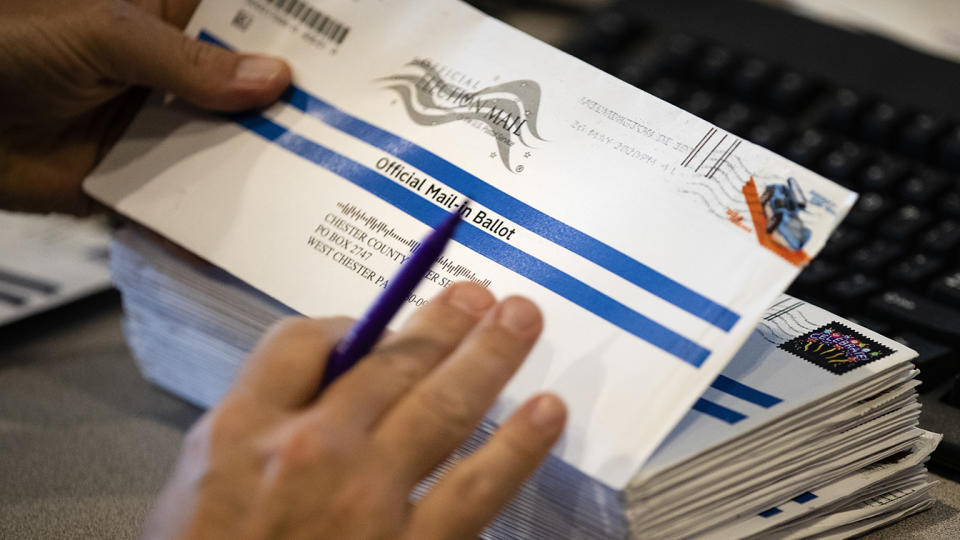
“Pre-canvassing allows counties to open envelopes, flatten and stack the ballots, and begin to scan the ballots, so results can be determined more quickly once tabulation begins on Election Day,” wrote Gene DiGirolamo, a Republican county commissioner in Bucks County, which includes some of Philadelphia’s northern suburbs, in an op-ed last week.
DiGirolamo wrote that “despite the rumors, falsehoods, and outright lies, pre-canvassing is not vote counting or early voting.”
“It is simply an administrative process to lessen the amount of time that county election directors and their staff have to spend opening envelopes and organizing ballots. Votes would not be counted until the polls closed,” he wrote.
State law currently forbids election clerks from opening mail-in ballots before Election Day. If that remains the law, mail ballots will likely not be counted for at least a few days, and possibly even longer, in part because the state is expecting a massive increase in mail voting because of the coronavirus pandemic.
“If we are not given the authority to do this, we’ll be forced to contend with a man-made disaster — one that easily could be avoided if our legislature and governor would work together,” DiGirolamo wrote.
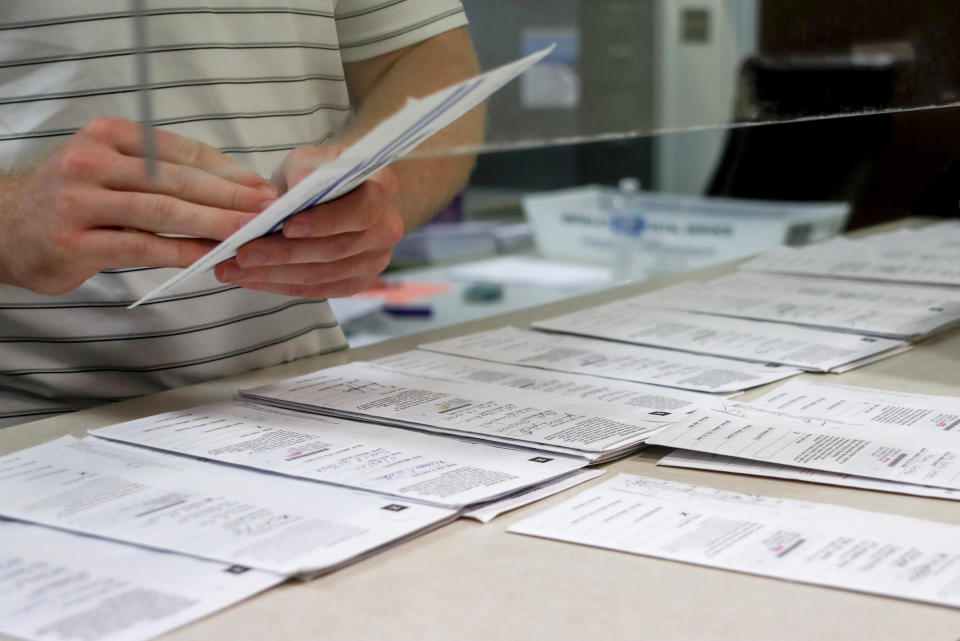
The need to pre-canvass mail ballots has never been as pressing as it is this year, because Pennsylvania voters have not usually cast ballots by mail in past elections, unlike other states where mail-in voting is more widespread.
But demand for mail-in voting has skyrocketed due to COVID-19. About 1.4 million Pennsylvania voters cast ballots by mail in the June 2 primary. In the 2016 primary, only about 84,000 Pennsylvanians voted by mail.
During the primary, “in approximately half the counties, ballots were still being counted over a week later” after Election Day because of Pennsylvania’s restrictive law, an Aug. 1 report from the secretary of state’s office said.
The secretary of state’s office requested in that report that it be given 21 days before Election Day to pre-canvass mail ballots.
Republicans control both chambers in the state Legislature, and Democrats say they are using the issue of pre-canvassing as leverage, trying to extract concessions that will make it harder to vote in other ways.
The state House passed a Republican-led bill two weeks ago that has yet to be taken up by the state Senate. The law would allow clerks to pre-canvass three days before Election Day. But the GOP included other provisions in the bill that would eliminate most drop boxes in the state and shut down an effort to allow voters to deliver their mail or absentee ballots by hand to a satellite voting location.
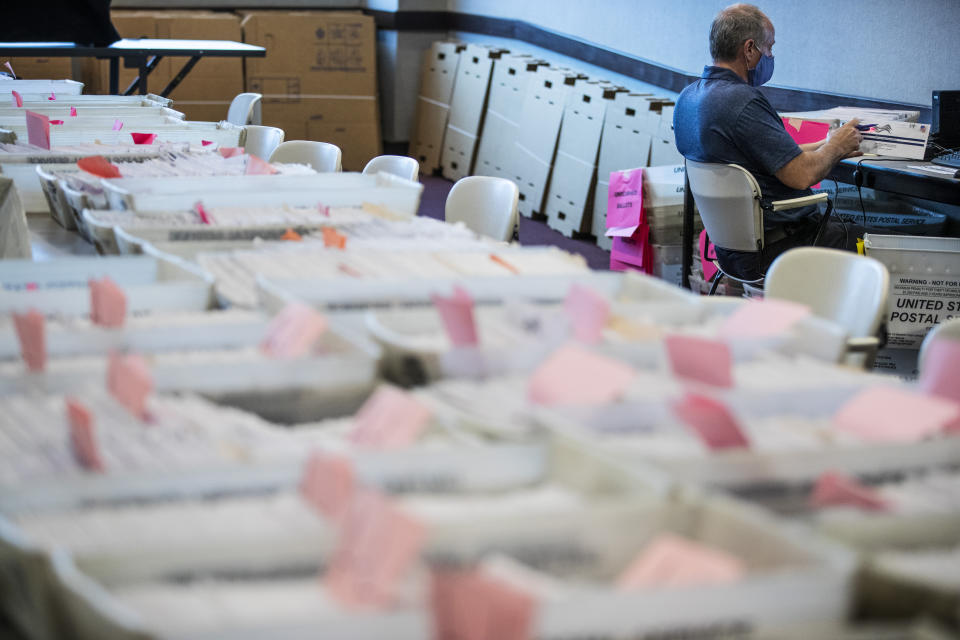
Drop boxes resemble blue Postal Service receptacles, only they’re run by county or local election officials and not by the post office. They are a secure way for voters to cast mail-in ballots without actually having to mail them in.
A bill passed last year in Pennsylvania, Act 77, allows counties to provide multiple locations where voters can cast a mail ballot in person ahead of the election, in addition to the county clerk’s office. But the Republican bill that passed the House would bar counties from receiving mail-in ballots from voters by hand other than at permanent government offices or the county courthouse.
A spokesman for House Speaker Bryan Cutler, a Republican from Lancaster, said the GOP opposes expanding drop boxes and satellite voting locations because “this is the first general election where we’re going to have no-excuse absentee voting.” Act 77 expanded mail voting by removing the need to have an excuse to cast one.
“That’s a major step,” Michael Straub, a Cutler spokesman, told Yahoo News. “That and other steps we’ve taken have really increased the ability for anyone who’s interested in absentee voting to do so. We want to make sure we get it right before we add additional steps.”
The Republican bill would also allow poll watchers to come from any part of the state to observe voting in large cities like Philadelphia. The law currently restricts poll watchers — who can challenge the validity of voters — to their own counties.
Democrats say that provision in the Republican bill opens the door to voter suppression.
“Anybody from anywhere in the state could come into a heavily African-American part of Philly and object to voting. I find that very problematic and could lead to voter suppression. Democrats are not going to budge on that,” said state Rep. Kevin Boyle, a Democrat who represents parts of northeastern Philadelphia.
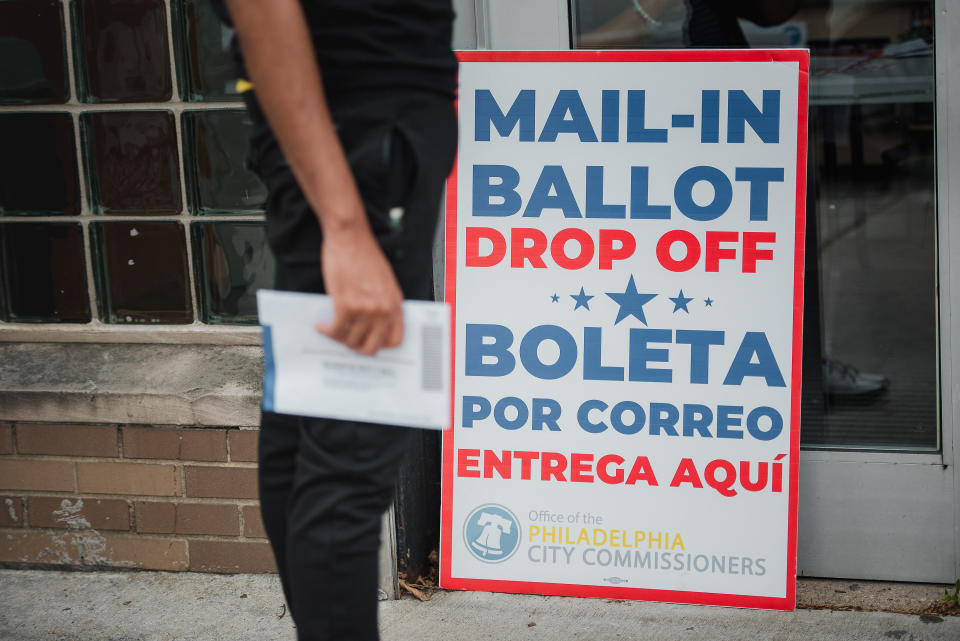
State Sen. Anthony H. Williams, a Democrat who represents part of Philadelphia, told Yahoo News that poll watchers coming into major urban areas from other parts of the state “could be as disruptive as they are productive.”
Democrats oppose expanding poll-watcher eligibility, but they support doing so for poll workers, who actually run the election. There are still concerns that the state may not have enough poll workers in November. Boyle has proposed allowing poll workers to volunteer anywhere in their county of residence, rather than restricting them only to the district in which they vote.
“Immediate action is needed to address the enormous volume of mail-in ballots expected to be cast. We need to ensure that Pennsylvania does not become a national embarrassment on Election Day,” Boyle told Yahoo News.
He introduced an amendment to the Republican legislation that represents a compromise on pre-canvassing. It would give clerks 14 days to open mail ballots and make sure they are in order so they are ready to be counted.
But Straub indicated that the GOP is not likely to support giving clerks more than three days.
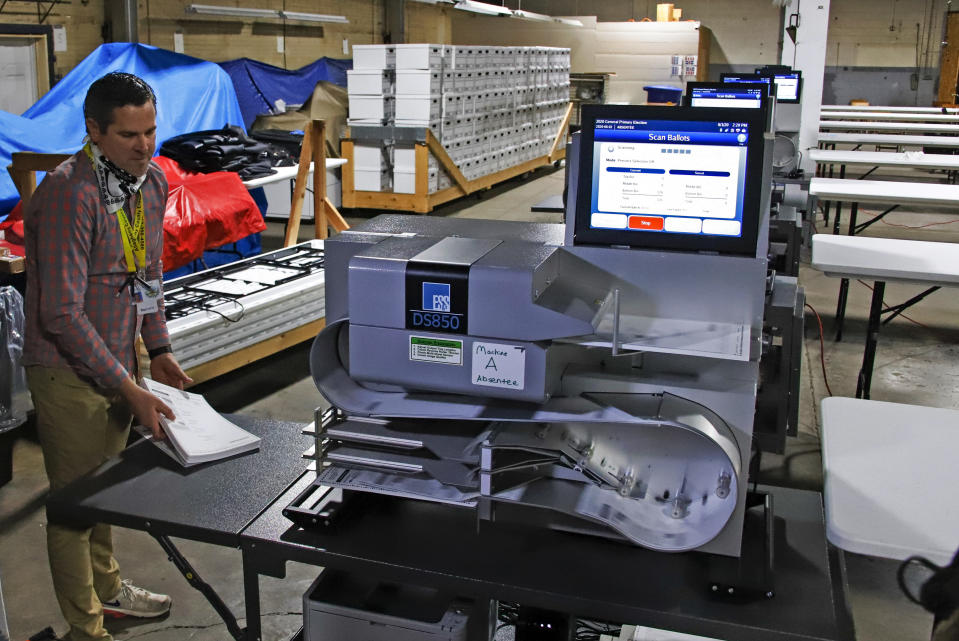
“There is openness to being at the table with the governor to find solutions, but the three days before is really the best counties can do because three days before the election is the deadline to challenge a ballot’s residency eligibility,” Straub said. “So allowing pre-canvassing when a ballot’s eligibility could still be challenged presents a potential issue ballot by ballot.”
A spokesman for state Senate Majority Leader Jake Corman, a Republican from central Pennsylvania, echoed Straub’s point, telling Yahoo News that once a mail ballot is opened for pre-canvassing, there are no identifying marks on it to connect it to a specific voter, and it can no longer be challenged by someone who thinks it might have been cast fraudulently.
The Legislature could move up the deadline to challenge mail ballots to coincide with the day it allows clerks to pre-canvass.
The debate echoes much in the area of election law, where election security concerns are weighed against other issues like voter access and, in this case, election integrity. A substantial delay in reporting results could gravely damage the integrity of the fall election and even lead to unrest in the country, and so legislators will need to weigh that against the ways in which they seek to prevent voter impersonation via mail-in balloting, which does happen but is not common.
“It’s not nonexistent. It happens to be rare, and it’s really hard to pull off in any large-scale way,” election expert Rick Hasen, author of “Election Meltdown,” told Yahoo News in July.
Pennsylvania Republicans and Democrats, however, did agree that counties should be required to send mail ballots out 28 days before the election, rather than the current 14. The GOP bill would also reduce the amount of time that voters have to apply for their mail ballots. The deadline to apply would be moved to 15 days before the election, rather than one week, as it is now.
Gov. Tom Wolf, a Democrat, on Tuesday said he is pushing the Legislature to allow pre-canvassing 21 days before Election Day. Wolf also said counties should be able to fill poll-worker vacancies 60 days ahead of the election, rather than the mere five days allowed right now.

Finally, Wolf called on the Legislature to allow ballots postmarked by Election Day to be counted as long as they are received by the following Friday. This would come into play if the state has a delay in its result and the number of outstanding ballots is great enough to have an impact on the winner. Current law requires ballots to be received by Election Day, but there is ongoing litigation to change this, given delays in Postal Service delivery.
State Sen. Steve Santarsiero, a Democrat who represents Bucks County, said there is “some willingness” on the part of Republicans to give clerks more time to pre-canvass mail ballots.
“There’s an understanding that it’s a problem,” Santarsiero told Yahoo News. “The issue is whether it will be held hostage.”
_____
Read more from Yahoo News:

 Yahoo Sport
Yahoo Sport 








































